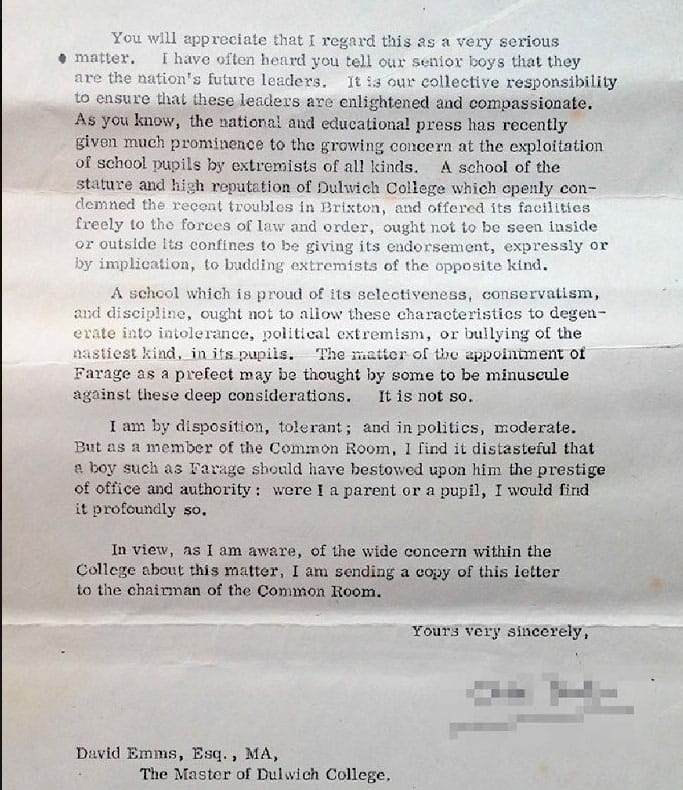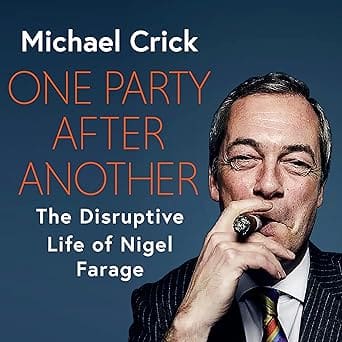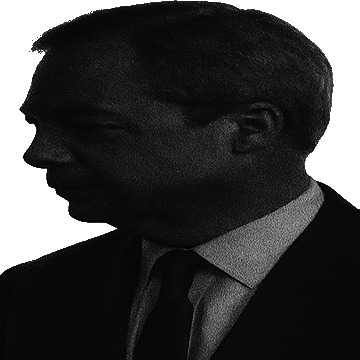Allegations about Nigel Farage’s school days at Dulwich College have resurfaced periodically for more than a decade. They hinge on how much weight to give a 1981 teacher’s letter and later media reports that described Farage as expressing racist or neo-fascist views as a teenager—claims he has repeatedly denied.
Dulwich College and the 1981 Prefect Letter
In September 2013, The Independent reported that Channel 4 News had obtained a June 4, 1981, letter from teacher Chloe Deakin to the headmaster opposing Farage’s appointment as prefect. The letter relayed staffroom concerns about “publicly professed racist and neo-fascist views” and referenced a claim boys had “marched through a quiet Sussex village” at night “shouting Hitler Youth songs.” The Guardian’s same-day coverage summarised the Channel 4 revelations.

Channel 4’s 2013 Revelations and the Media Pile-On
The Guardian reported the allegations as UKIP’s conference opened. In a video clip that day, Farage called the claims “wildly exaggerated” and denied involvement with extremist groups. The Telegraph quoted him describing himself as a “bolshie teenager” who pushed boundaries but insisted he was never a member of a far-right organisation.

Farage’s Denials and How Accounts Differ
Farage has consistently denied singing “Hitler Youth” songs or affiliation with neo-fascist groups at school. When the claims resurfaced in 2025 political exchanges, The Times noted the origins in the 1981 letter and reiterated Farage’s denials, stressing that the phrasing derives from a teacher’s account rather than a verified disciplinary finding.
Accounts from contemporaries differ. Some former pupils and teachers, quoted in later pieces, recalled racist or extremist talk; others told reporters and biographers that Farage was provocative but not ideologically committed. A Guardian interactive (2024) collates sharply contrasting recollections.
What Later Reporting and Biographies Add
Journalist Michael Crick’s biography, One Party After Another (2022), revisits the Nigel Farage school material. Reviews summarise the staff debate over prefects and the Deakin letter, while noting the mixture of testimony and Farage’s denials. See reviews and commentary in The Guardian and openDemocracy.
In October 2025, a Guardian explainer revisited the episode after new political remarks revived the controversy, again setting out the original letter, subsequent press coverage, and Farage’s rebuttals.
So, What Do We Actually Know?
- Documentary record: a 1981 teacher’s letter describing colleagues’ concerns and relaying an anecdote about “Hitler Youth songs.”
- Media record: Channel 4’s 2013 scoop and follow-on reporting summarised the letter and gathered recollections.
- Denials: Farage has repeatedly denied the Nazi-song claim and any far-right affiliation at school, including on camera in 2013.
There is no public disciplinary record confirming the song allegation beyond what the letter reports. Much rests on recollection versus denial, weighed across sources.
New Guardian revelations in November 2025
A Guardian investigation has revealed new allegations of racist and antisemitic behaviour by Reform UK leader Nigel Farage during his time at Dulwich College, a prestigious private school he attended in the early 1980s. The report, based on interviews with over a dozen former classmates and teachers, includes claims that Farage sang Nazi songs, mocked Black and Jewish students, and was intensely fixated on race and fascism from a young age.
Several former pupils recall Farage using racial slurs, praising Adolf Hitler, and making the Nazi salute in public and school settings. One ex-teacher described the behaviour as “deeply shocking” and said the school leadership at the time failed to act decisively. While some witnesses say Farage’s behaviour mellowed in later years, others argue it shaped his worldview and political trajectory. One former pupil who spoke to The Guardian recalled Farage teaching younger boys the “Gas ’em all” song, or at least leading the singing of it on school coaches.
Farage has previously dismissed similar accusations as politically motivated or exaggerated schoolboy antics. However, the new testimonies are more extensive and specific than past reports, potentially posing reputational damage at a critical moment for Reform UK, which is gaining electoral traction.
Farage and Reform UK declined to respond to the Guardian’s specific questions. The revelations may intensify scrutiny over the party’s leadership and values.
Farage’s response to latest revelations
With calls on Farage to account for his alleged behaviour at Dulwich College increasing in volume, on 24 November 2025, he responded to questions from ITV News.
Final Thoughts
Decades-old school controversies are hard to prove definitively. The Dulwich College material carries political charge, but the public record remains contested: a critical teacher’s letter and some corroborating recollections on one side; explicit denials and more qualified memories on the other. Distinguishing between what a letter said, what witnesses recall, and what can be proven is essential when assessing what really happened. In his statements to ITV News, Farage focused on how long ago the events were and whether or not there had been intent to cause harm, instead of whether the allegations were true or false. The new revelations of November 2025 ensure that this controversy is unlikely to go away any time soon.
Suggested reading

Michael Crick’s One Party After Another offers a compelling, meticulously detailed biography of Nigel Farage, chronicling his journey from City trader to one of Britain’s most controversial political figures. Crick blends investigative rigour with engaging narrative, exposing Farage’s personal flaws, political strategies, and relentless ambition. The book provides a balanced account, neither fawning nor dismissive, instead painting a complex portrait of a man who reshaped British politics. Through deep research and interviews, Crick reveals both the chaos and calculation behind Farage’s rise, making this a must-read for those interested in Brexit, populism, or the inner workings of modern political movements. Shop for this book on Amazon. (#Ad).
